ICT meaning
Last updated 1 month agoWhat is Information and Communications Technology (ICT)?

What does ICT stand for?
InFormation and Communications Technology (ICT) is the usage of Computing and telecommunication technologies, sySTEMs and equipment to facilitate the manner facts is created, collected, processed, transmitted and stored. It includes computing technology like Servers, Computer Computers and Software Program programs, as well as the wired and wi-fi communique technology that support telephones, the Internet, the Internet of Things (IoT) and the Metaverse. The purpose of ICT is to enhance get entry to to Data and and Make human-to-human, human-to-Device and gadget-to-device (M2M) communique easier and Greater green.
This large label consists of the infrastructure and telecom additives that permit Synchronous and Asynchronous conversation throughout short and lengthy distances. It includes telecommunication and Cloud Computing offerings as well — and the governance guidelines that assist their use.
The sigNiFicance of ICT can not be overStated because it has grow to be the inspiration of Modern-day society — using innovation, improving productiveness and fostering global connectivity.
History and Evolution of ICT
The idea of ICT can be traced back to the 19th century with the improvement of the telegraph and the phone. These innovations revolutionized the manner humans labored and interacted socially by means of making it viable for one person to speak with every other individual in a one-of-a-kind region in real or close to-actual time.
In the middle of the 20 th century, radio and tv brought the idea of mass conversation, and by using the quit of the century, the net had become a mainstream tool for communication, trade and enjoyment. Its use continued to grow Swiftly in the following years, revolutionizing the manner people work and Digitally transforming the way people speak.
Today, Broadband internet and Smartphones have made it less difficult than ever for humans to create, get right of entry to, proportion and devour data and in the future, ICT guarantees even more interesting traits. 6G networks will provide faster and greater dependable connectivity, Generative AI structures like ChatGPT will trade the manner humans create and collect Records and emerging technology like Quantum Computing and Web3 will inspire a huge Range of latest ICT tools and applications.
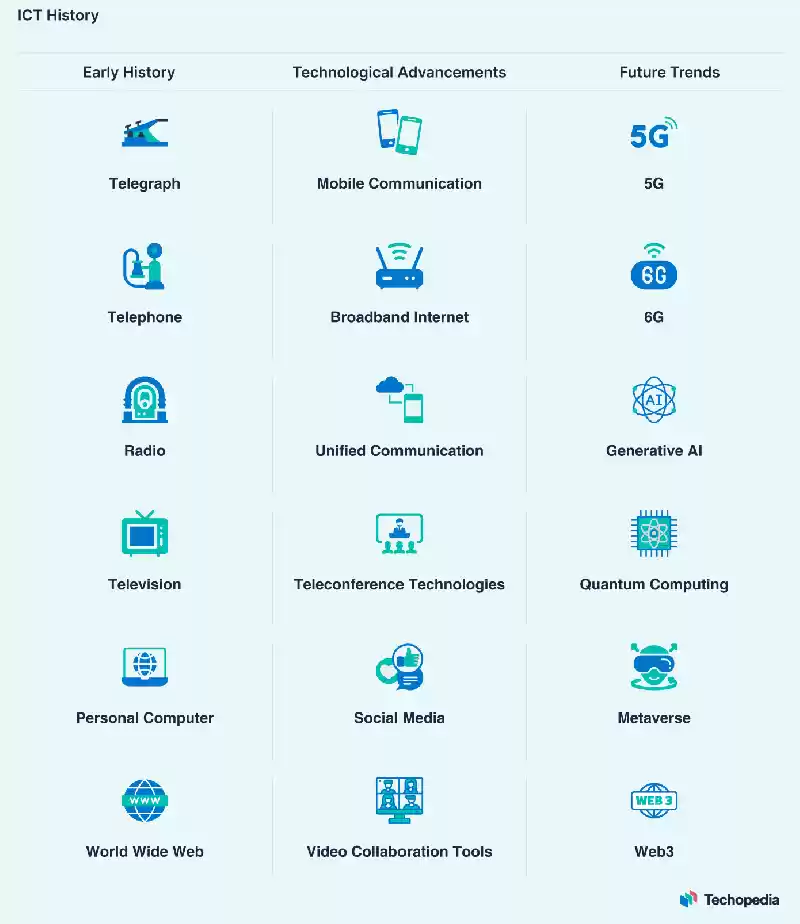
Information and Communication Technology Basics
ICT is often used as a synonym for records era (IT), however the terms will have slightly Exceptional meanings while used in specific Contexts. In the USA, as an example, the Acronym ICT is used in greater often in education because in that context, IT can also imply Instructional Technology. In a few industries, IT best applies to organization computing, whilst the broader label ITC encompasses both IT and conversation technologies.
Using IT and ICT interchangeably can cause confusion, particularly in situations wherein the difference between the 2 is important. For example, a activity posting that requires knowledge in IT can be exceptional from one that requires knowledge in ICT, as the latter may additionally require extra capabilities that specifically aid communication and Collaboration equipment.
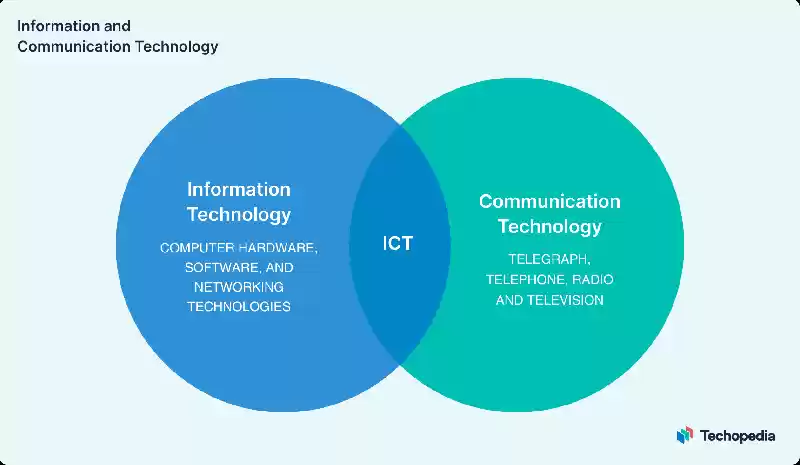
IT is often taken into consideration to be a subset of ICT that offers with the technical elements of managing information, even as ICT is a broader term that encompasses each IT and verbal exchange technology.
While IT offers in most cases with pc Hardware, Software, and Networking technologies, ICT includes no longer most effective those technology but also conversation technology consisting of telegraph, Cellphone, radio and television.
ICT Infrastructure and Systems
Information and communique era consists of a huge range of facts, telecommunication and guide tools and services that work together to facilitate communication.
This consists of:
- Hardware and software program that supports the way records is created, disseminated, obtained and saved.
- Infrastructure and electronics that allow communique among hardware devices.
- Protocols and Interfaces that allow seamless communique and statistics exchanges between exceptional hardware and software program Components.
- Tools for defensive touchy records and making sure the Integrity of an ICT machine.
- Standards for protective Data in Transit, for the duration of processing and at relaxation.
- Governance rules for how data need to be Accessed, secured, processed, transmitted and saved.
- Workers who've the skills required to layout, develop, hold and aid ICT systems.
ICT infrastructure includes statistics generation, telecommunication era and the services they aid.
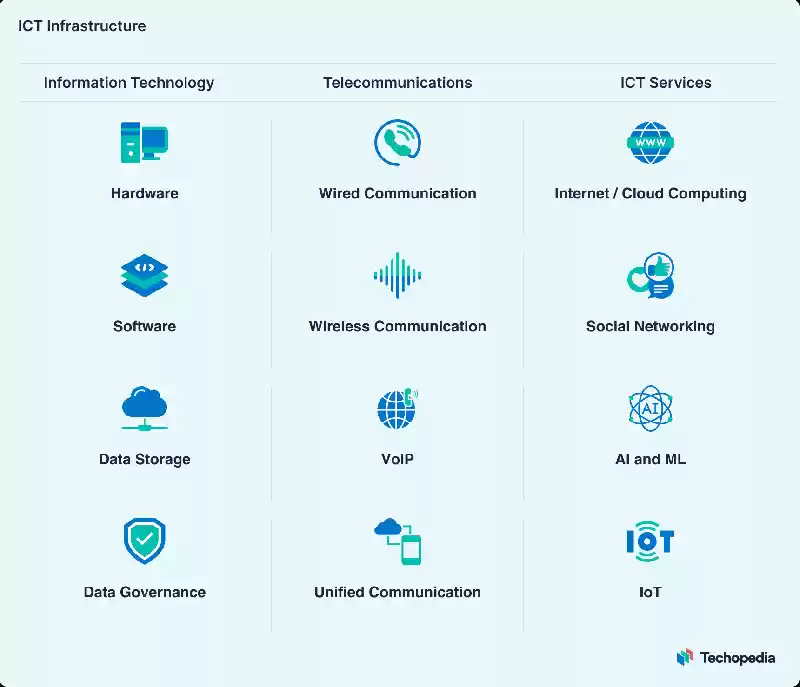
Centralized and Decentralized ICT
When ITC architectures are centralized, the hardware, software program and commUnity infrastructure additives that assist communication are located in a single location and users can most effective get admission to these sources from that place. This technique was fee-efficient at some point of the early days of computing while the price of stressed out conversation infrastructure was high and Mainframes had confined processing energy.
Broadband internet made it viable to decentralize ITC architectures. Once facts will be transmitted quicker and over more distances, it became feasible to keep and get right of entry to statistics remotely and run the identical applications without a doubt on a couple of faraway servers. This led to extended adoption of unified communique structures (UCSs), Cloud-primarily based services and new sorts of collaboration equipment.
The extended Bandwidth broadband affords has additionally inspired new ways to apply Peer-To-Peer (P2P) community architectures. In a P2P community, each Node (or person) can act as each a server and a purchaser and share information with different nodes without the need for a imperative server.
Today, this sort of structure is frequently associated with bLockchain and cryptocurrencies, but it’s vital to do not forget that P2P additionally performs an vital position inside the Internet of Things by way of allowing IoT gadgets to communicate with each different, percentage records and perform complex tasks that person devices can't manage.
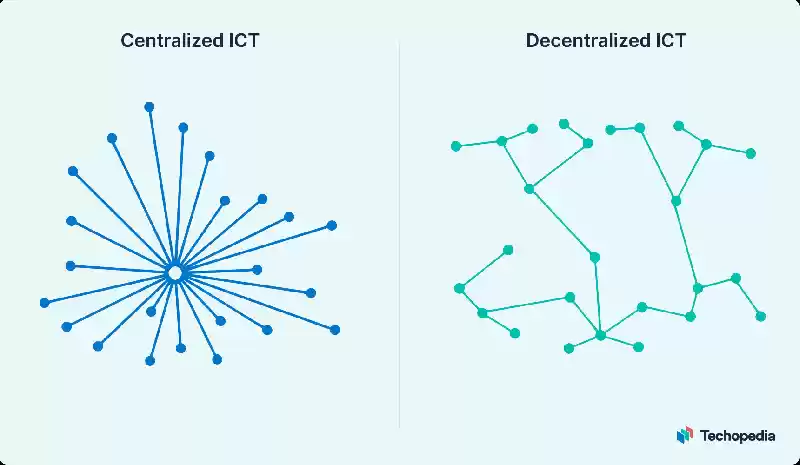
Impact of ICT on Society
ICT has reshaped the arena’s financial panorama and personnel dynamics.
E-commerce has created new opportunities for groups and consumers alike, assisting Globalization through permitting Transactions and interactions to arise across borders seamlessly. Smart cities are improving urban dwelling by leveraging IT and communique era to improve transportation, Public services and municipal infrastructure.
The mixture of facts generation and communique era has had an enduring impact on society. As technology and collaboration tools continue to boost, agencies are locating it important to always reevaLuate their nice practices for sharing virtual statistics and governments are always looking for approaches to reduce the virtual divide.
Digital literacy has become a important talent for every body. The digital economic system has delivered new forms of jobs, progressed productivity and allowed personnel to collaborate remotely from just about everywhere they could connect with the internet.
The environmental outcomes of ICT have also been profound. Data Centers and digital devices require giant quantities of electricity to perform, and the speedy boom and consistent evolution of technology has brought about a surge in e-waste as Obsolete gadgets are discarded. This waste frequently consists of risky materials that pollute the environment and may damage human health.
As IT and conversation technology keep to advance and eMerge as extra like a necessary application than some thing excellent to have, people, groups and governments want to understand each the blessings and demanding situations of ICT’s effect on society. Best Practices for Constructing a greater related, inclusive and environmentally accountable world include:
- SupPorting ESG (environmental, social and governance) projects.
- Prioritizing the development of less costly, repairable digital technologies.
- Investing in infrastructure and connectivity solutions that provide remote and underserved areas with get right of entry to to ICT services.
- Encouraging the improvement and adoption of open requirements and sturdy facts safety guidelines like GDPR.
- Facilitating international cooperation and partnerships between governments and organizations.
- DeveloPing new approaches to train human beings approximately ICT.
- Promoting the advent and dissemination of neighborhood content that displays the values of users international.
ICT Skills, Certifications and Job Opportunities
As the sector will become increasingly more reliant on virtual communication, the process marketplace for ICT professionals keeps to increase. Individuals with the right abilities and qualifications can look Forward to a dynamic and worthwhile profession in this ever-evolving area. To achieve this enterprise, applicants ought to possess a combination of technical abilities and smooth capabilities.
The following jobs require candidates to have a sturdy foundation in each information generation and communique technologies:
- Telecommunications Engineer: Designs, installs and maintaining conversation structures and networks, including smartphone, wireless and fiber-optic networks.
- Unified Communications Specialist: Focuses on integrating numerous communique technologies, which includes voice, video, messaging and collaboration tools.
- Network Architect: Designs, implements and now and again manages information verbal exchange networks to make sure optimum performance, reliability and protection.
- VoIP Engineer: Specializes in designing, implementing and retaining Voice Over Internet Protocol structures.
- Wireless Network Engineer: Designs, deploys and keeps wireless conversation structures, consisting of Wi-Fi networks, mobile networks and satellite tv for pc communications.
- Radio Frequency Engineer: Works with lengthy-range and short-Variety RF technologies that permit information to be shared.
- IoT Solutions Architect: Develops and implements P2P wi-fi networks that allow Internet of Things (IoT) shrewd gadgets to communicate with every different.
- Video Conferencing Engineer: Specializes inside the design, Implementation and renovation of video conferencing systems. May also be accountable for establishing video conference exceptional practices that allow employees and enterprise companions to talk securely.
- Telepresence Engineer: Designs and keeps telePresence structures that use tremendous video and audio verbal exchange technologies to create immersive, real looking meeting reports for far flung individuals.
ICT Certifications
While university stages are perfect, often it’s viable to get a process in ICT with the aid of acquiring a certification (or multiple certifications) that validates the candidate’s know-how and competence.
Popular certifications for data and communication jobs include:
- Cisco Certified Network Professional (CCNP) Collaboration: Focuses on advanced collaboration and unified communication abilities, which includes voice, video and messaging answers.
- CompTIA Network : Validates the candidate has a stable basis in networking concepts, consisting of Network Design, Configuration, control and Troubleshooting.
- CompTIA Security : Certifies a professional’s expertise and abilties in IT security, which includes community security, Risk Management and stable verbal exchange.
- Mobile Device Security Analyst (GMOB): Validates the applicants understanding approximately the safety components of wireless verbal exchange technology and cell gadgets, together with smartphones and Tablets.
- Certified Wireless Network Professional (CWNP): Certifications: A suite of certifications that certify the applicants knowledge approximately various components of wi-fi networking.
- Microsoft Teams Voice Engineer Expert: Candidates possess understanding and understanding in telecommunication technologies, along side hands-on revel in the use of Microsoft Teams, Microsoft 365, and PowerShell.
ICT and Digital Transformation
As agencies had been compelled to conform hastily to make certain enterprise continuity and keep productivity in the course of COVID-19 lockdowns, virtual transformation have become a need in place of an alternative.
Companies of all sizes suddenly had to rely on virtual collaboration gear and offerings to hold their operations jogging. TeleConference Calls, screensharing apps and virtual assembly systems like Zoom and Google Hangouts fast have become vital tools for employees compelled to make money working from home the pandemic.
The need for verbal exchange and collaboration equipment for the duration of the pandemic touched each sector of the financial system, including training, healthcare and e-trade.
- Online e-learning Platforms skilled a surge in demand as colleges and universities needed to quickly transition to far flung studying.
- Contact tracing, far off affected person tracking and Telemedicine became imperative components of healthcare shipping for the duration of the crisis, permitting healthcare specialists to offer critical services at the same time as minimizing the threat of infection and making sure the protection of both patients and Carriers.
- E-commerce structures thrived during the pandemic as consumers sought safe and handy purchasing alternatives. The fast increase of e-trade led to an accelerated need for digital offerings that allowed organizations to satisfy the growing needs of their Clients.
- Virtual occasions and conferences gained traction, permitting companies to share knowledge and foster professional connections for the duration of lockdown.
The Importance of Cybersecurity
As the world persisted to embody the virtual transformation delivered on with the aid of the pandemic, it quick became clean to individuals, organizations and corporations that cybersecurity was extra crucial than ever.
In 2022, forty seven% of all U.S. Companies misplaced cash due to a cyber Attack. According to the “Hiscox Cyber Readiness Report 2022,” every attack fee organizations within the U.S. A mean of $18,000.
The international annual value of Cybercrime is predicted to hit $eight trillion in 2023 and grow to $10.Five trillion through 2025, according to Cybersecurity Ventures’ “2022 Official Cybercrime Report.”
In the wake of COVID-19, famous assault Vectors include:
- Phishing: Uses Social Engineering, unsolicited mail and SMS textual content messages to trick the sufferer into revealing touchy records or benefit network get entry to to behavior different malicious sports.
- DDoS: Floods the target with excessive site visitors and makes it unavailable to valid users to divert attention from different malicious sports.
- Ransomware: Malicious software program that encrypts a victim’s data and needs fee for the Decryption key. This type of assault vector may be added as a provider.
- Supply Chain Attacks: Targets third-party software and hardware vendors to benefit access to a primary target’s community and data.
- Cryptojacking: Installs cryptocurrency Mining software on an unsuspecting users’ device and uses their pc assets to to generate digital foreign money without the sufferer’s knowledge or consent.
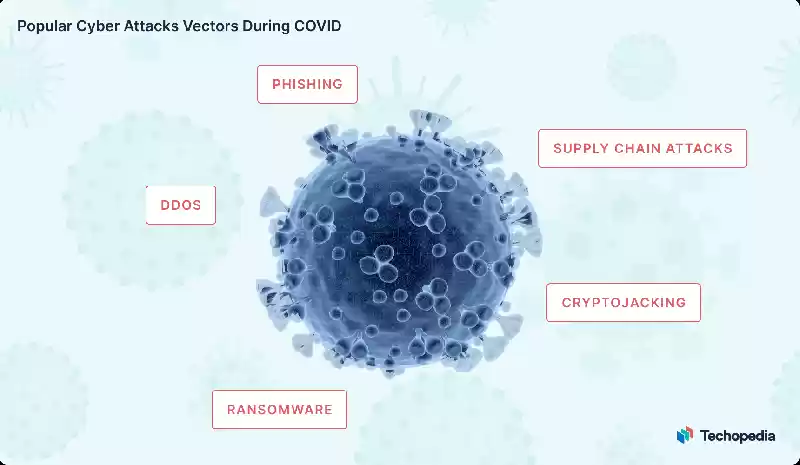
To combat those sorts of increasingly state-of-the-art and pricey threats, ITC directors must layer their protection efforts and follow those exceptional practices to assist ensure their information generation and communique offerings run smoothly:
- Implement Firewalls and intrusion detection structures (IDSs).
- Use zero accept as true with and require multifactor Authentication (MFA).
- Follow the Principle of Least Privilege (PoLP)
- Encrypt touchy facts.
- Support cybersecurity awareness education.
- Create a complete incident and reaction plan.
- Require all major stakeholders to check, check and assist replace the plan on a everyday basis to preserve up with the ever-changing hazard Landscape.
Compliance and ICT
Compliance is the technique of adhering to the felony, moral and professional standards that govern using era.
As ICT keeps to adapt, so does the want for groups and Businesses to comply with countrywide and international legal guidelines and rules for ICT — or face felony consequences and reputational damage.
Because cyber threats have turn out to be increasingly state-of-the-art, governments worldwide are mandating Stringent cybersecurity measures to shield sensitive facts and hold consumer Privateness.
As synthetic intelligence (AI) and gadget mastering (ML) Packages turn out to be more state-of-the-art, new compliance measures are predicted to cope with intellectual assets and copyright issues and help mitigate the chance of identification fraud through generative AI.
Governments and economic institutions have also introduced compliance measures particular to cryptocurrency transactions to decrease the dangers that digital forex may be used for money laundering, terrorist financing and tax evasion. Cyrpto compliance, which already includes Know Your Customer (KYC) and Anti-Money Laundering guidelines, is crucial for agencies that want to Function inside the cryptocurrency space.
ICT and Entertainment
The effect of ICT on the conventional enjoyment enterprise is undeniable. The shift from Physical To Virtual Media has brought about new commercial enterprise models and sales streams for IT and communication offerings and modified consumer behavior. Examples consist of:
- Streaming video offerings, which include Netflix and Hulu, have modified the manner human beings devour films and television indicates.
- Social Media and content sharing systems, like Facebook and YouTube, have redefined the manner virtual content is created, fed on and monetized.
- Online Gaming and having a bet systems have brought new audiences to on line leisure options.
- Advances in digital reality (VR), augmented truth (AR) and Mixed Reality have renewed interest in interactive storytelling and the Metaverse.
- Digital Audio Workstations (DAWs) have streamlined song manufacturing, making it more on hand to aspiring musicians.
The future of ICT: Opportunities and Challenges
As society ventures further into the 21st century, statistics and communique generation is predicted to hold evolving at an exceptional pace and contact every thing of people’s lives.
ICT’s have an impact on on business and management has been profound. From streamlining operations and improving decision-making to enabling new commercial enterprise models and fostering international collaboration, era has become an fundamental a part of each modern-day establishments and small organizations.
The destiny of ICT is undeniably thrilling, but it also demands a considerate and proactive Method to planning as a way to make certain generation’s impact on society is each advantageous and equitable.
One of the maximum widespread challenges dealing with ICT is the Digital Divide. Ensuring that all individuals, irrespective of their vicinity or socioeconomic repute, are digitally literate and feature get admission to to era and the net goes to be crucial for fostering inclusive boom and decreasing inequality. This precise task goes to require concerted efforts from governments, the private quarter and civil society.
Data networking and cybersecurity have additionally emerged as vital demanding situations. Protecting ICT infrastructure from terrorists and IT structures from statistics breaches, even as also making sure the privacy of Personal facts, is going to require resilient networks that are able to helping an ever-growing demand for facts. In turn, that is going to require consistent vigilance and vast investments in cybersecurity.
In training, ICT has transformed the way humans educate and analyze. Artificial Intelligence and e-getting to know structures that help virtual and augmented truth are expected to similarly revolutionize the educational landscape. As the demand for tech and communications capabilities maintains to grow, there can be a wealth of recent activity possibilities in areas which include generative AI, Software Development, information Analytics, community engineering and cybersecurity. Educating and making ready employees for these emerging roles, is critical to ensuring that the blessings of era are shared broadly and that every one individuals are prepared to reach an more and more digital world.
Environmental, social and governance (ESG) troubles should now not be left out, due to the fact technology’s impact on society extends a long way beyond mere comfort and efficiency. For Instance, cloud computing has raised concerns approximately information sovereignty and privacy, at the same time as the rise of synthetic intelligence and Automation has sparked debates about activity displacement and ethical selection-making.
As human beings navigate the destiny of ICT, it's miles important for society to stability the need for development with the safety of Character rights and the well-being of ICT customers.
Your Score to Information and Communication Technology (ICT) article
Score: 5 out of 5 (1 voters)
Be the first to comment on the Information and Communication Technology (ICT)